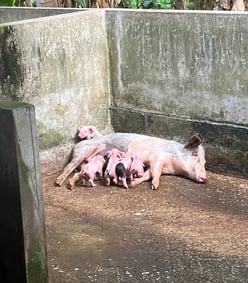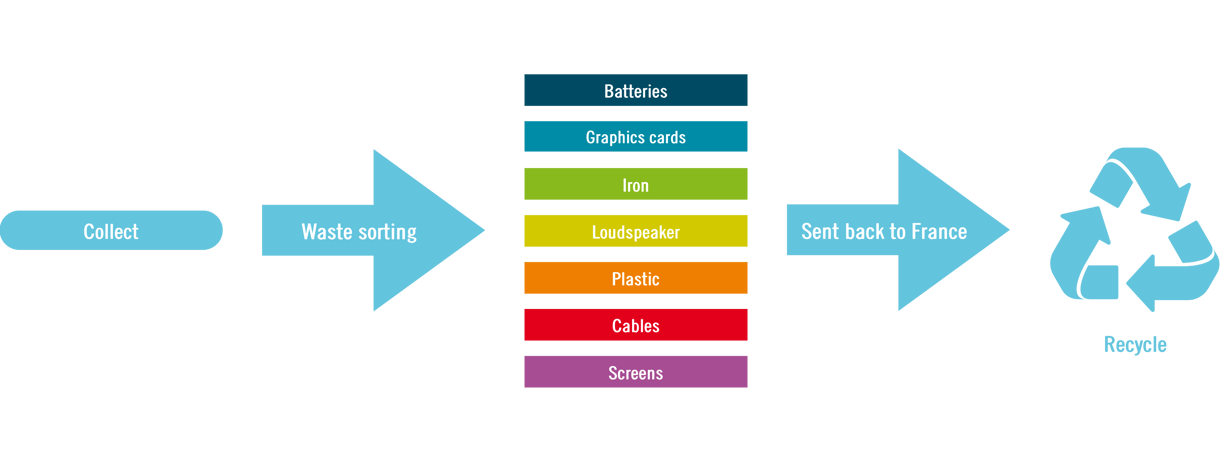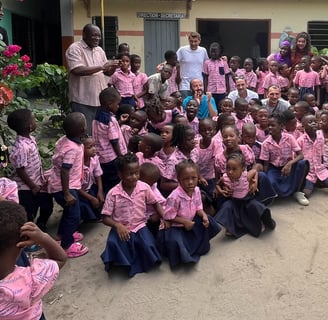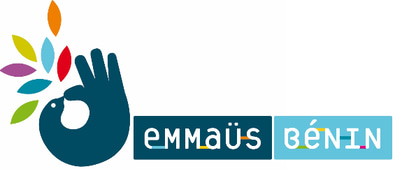The primary goal of Emmaüs Pahou is to assist the most disadvantaged by offering an inclusive welcome for better social and professional reintegration and to act directly on the immediate causes of poverty.


Contacts
emmauspahou@gmail.com
+229 97 57 23 43
VONS Cyclone
01 BP 3622 Cotonou
EMMAÜS PAHOU






Our Story
Emmaüs Pahou was founded thanks to Isidore de SOUZA, then Coadjutor Archbishop of Cotonou, in a health center created on a destitute lacustrine archipelago. He met three members of the executive committee of Emmaüs International in 1990 in Benin. Highly interested in the experiences of Emmaüs communities around the world, he went to live incognito in the Emmaüs community of Montbéliard in France. Upon his return, the Archbishop created a work community, based on agriculture, with the aim of training young people and enabling them to facilitate their reintegration.
It was with this spirit that the Hêvié community was born in 1991, renamed Pahou in 2003. This group became a member of Emmaüs International in 1992.
Our Activities
Women's Support and Accompagment Unit
Community of Life and Work
Support for Saint Hélène de Castor School
Social Activities on Lake Nokoué
Bocage Workshops
Pahou Health Center


Community of Life and Work
SOCIAL & SOLIDARITY ECONOMY




Pahou
Togbin










They also raise pigs, chickens, rabbits, goats, and ducks.
The main goal of this activity is to enable the companions to reintegrate into society. Thus, once their training in our community is completed, we continue our support; Emmaüs Pahou supports their job search or apprenticeship and helps them reconnect with their family.
The Pahou community produces various vegetables such as tchayo, amaranth, African basil, carrots, and tomatoes; as well as fruits: bananas, lemons, mangoes, soursops, and papayas.
The weekly production is sold every Saturday morning at the association's store, located in Cotonou.


Emmaüs Pahou owns two farms: in Pahou and Togbin, specializing in market gardening, fish farming, and livestock.
These farms constitute real communities of life and work since young people in difficult situations are welcomed and trained in agricultural activities.
At the end of their training, which lasts 2 to 3 years, the companions have the choice to leave and find work elsewhere, that is, to reintegrate into society, or to stay and continue communal life with the other companions.




Gboma
Papaya
Vernonia
Women's Support and Accompaniment Unit
Emmaüs Pahou offers a support and accompaniment unit for women's groups to enable them to develop their income-generating activity. This activity has two aspects: economic, Emmaüs Pahou financially supports the activities of these women, and social since the association offers them various social training.
Emmaüs Pahou also offers them a health mutual.


Financial Support


Socio-professional Training
Social Support




Bocage Workshops
Emmaüs Pahou also coordinates the activities of the Cotonou Bocage Workshop. This workshop is an offshoot of the Bocage Workshops in France and aims to collect waste and electrical and electronic equipment (WEEE), sort them by category before sending them back to France for recycling.
The goal of this activity is to clean up the living environment and the environment since, at present, electrical and electronic waste is thrown into nature or burned, causing toxic fumes.


The Bric-à-Brac
SOCIAL & SOLIDARITY ECONOMY






1
2
3
Thanks to the solidarity of several Emmaüs European groups, Emmaüs Pahou receives several containers per year. The received items are then enhanced, that is, cleaned and repaired, then sold in our Bric-à-brac store located in the Sainte Rita district in Cotonou.
This activity is the association's primary source of revenue and allows financing all of Emmaüs Pahou's activities.
Lake Nokoué










9 water towers
103 drinking water fountains
85 sanitation blocks
In 2006, Emmaüs Pahou, and more broadly Emmaüs International, committed, alongside the lake fishermen's association and local authorities, to a large-scale project: providing drinking water and sanitation infrastructure to the entire lake city of Sô-Ava. Thus, in 2016, 9 water towers, several pumping stations, 103 drinking water fountains, and nearly 85 sanitary blocks were built, allowing 80% of the population, or more than 100,000 people, to have access to drinking water and suitable latrines. In addition to these infrastructures, Emmaüs Pahou offered training to the local population to enable them to maintain the equipment and participate in the sanitation of their commune.
However, since 2022, following a government reform, the water supply infrastructures and their management have been taken over by the state.
Despite the completion of the initial project in 2016, Emmaüs Pahou wished to continue supporting the So-Ava population, particularly women, to enable them to develop and strengthen their income-generating activities. Emmaüs Pahou economically supports the activities of these women, offers them literacy courses in the local language, and organizes socio-civic training on various themes (sanitation, hygiene and health, rights, sexual and reproductive health, etc.).
However, since the state took over the hydraulic infrastructures, our support activities for the population are compromised.


That's why we are currently actively seeking funding to maintain our activities with this particularly vulnerable population at all costs.
Pahou Health Center
We wish to open a health center to allow companions and residents of Pahou to have access to basic health care at a low cost.
We are currently waiting for government approval to open our health center.


Saint Hélène de Castors School


Emmaüs Pahou also supports the Saint Hélène de Castor school, which educates 236 children from kindergarten to ninth grade.
Emmaüs Pahou sponsors about 75 children by financing 50% of their tuition fees and providing educational materials.
Emmaüs Pahou's Projects
Emmaüs Pahou wishes to support local families in developing their skills in the field of agriculture. For this, Emmaüs Pahou plans, initially, to identify families who own land but do not exploit it. Then, Emmaüs Pahou would train the children of these families in agriculture and subsidize them so that these families can meet their needs and achieve food autonomy.
Emmaus Pahou aims to enhance the skills of village women by offering workshops to learn how to create hygiene and cosmetic products from natural materials. This would enable many women to develop their own income-generating activities.
For several months, aquaculture activities have ceased in Pahou, as the fish farming infrastructures were destroyed by the rising waters of the lake.
Thus, Emmaus Pahou would like to revive this activity, which constitutes an economic resource and also a complete aspect of Pahou's agricultural training.
Social and Family Agriculture
Self-Made Training Workshop
Reviving Aquaculture in the Community
Eco-Tourism
We aim to develop an eco-tourism activity within the Pahou community. Initially, this would allow us to welcome new companions and offer them training in fields such as hospitality, catering, or tourism. Subsequently, it would enable us to generate additional income, which would contribute to funding other social actions, while offering a self-sufficient activity that highlights local landscapes and activities.
Sponsorship Project on Lake Nokoué
The goal of this project is to cover the educational expenses of orphaned, vulnerable children and children out of school in the Sô-Ava commune. We wish to provide them with uniform outfits, school supply kits, and one meal per day for each primary school child; cover the tuition fees for students in apprenticeship programs; and offer remedial courses for students preparing for exams.
Textile Sorting and Recycling Center
This project involves setting up and electrifying the premises that will house the Pahou sorting center. With this textile sorting and recycling center, we could buy clothes by the container and prepare them for resale. This would allow us to generate more income so that we can welcome additional companions.
The sorting center is currently under construction, but we need equipment such as a textile press and scales to make it functional.
Educational and medicinal garden
We plan to create an educational and medicinal garden in the heart of the Pahou community. The aim of this garden will be to train women and young people in the various uses of medicinal plants, and to enable the population of Pahou to benefit directly from them.














Séverin MEKPOSSI
Accounting Assistant
Cynthia ATOHOUN
Project Manager
Françoise MENSAH
Cashier and Responsible for Solidarity Session
Gylydie GNANSOUNOU
Administrative Secretary


Administration
Pahou Life and Work Community




Pascal
Community Manager






Women's Support and Accompaniment Unit










Bienvenue
Unit Manager




Cotonou Bocage Workshop






Anita ADEBAYO
Project Manager




The Bric-à-Brac








Hubert ATOHOUN
Manager
The lake






José HOUNSA
Manager and Monitoring Officer
Cynthia ATOHOUN
Deputy Manager
Myllie ASSANKPON
Support and Training Officer
Harielle AHLIN
Traceability Manager
Galina GBESSO
Sorter
Gladstone FOSSOU
Sorter
Birane SECK
Collector
Eli GANSOU
Warehouse Worker
Our team
Félix
Togbin Sector Manager
Bienvenu
Togbin Sector Manager
Doctrové
Pahou Companion
Alphonse
Pahou Sector Manager
William ADOME
Support and Training Officer
Gylydie GNANSOUNOU
Cashier
Marcel KPODEME
Warehouse Worker
Jean DANSI
Driver and Warehouse Worker
Pierre
Driver and Warehouse Worker
Sandra KOUKPONOU
Facilitator
Edmond DENON
Facilitator
Audrey FAGBEHOUNRO
Collector
Patrick ATOHOUN
President








Jacques
Togbin Companion
Daniel
Pahou Companion
Honoré
Pahou Companion
Mehiha
Pahou Companion
Patrice
Pahou Companion
Eugénie
Pahou's Cook
























